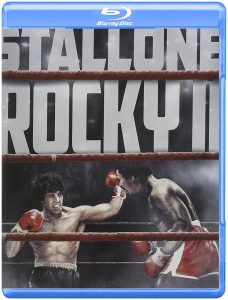Life doesn’t become easy after your first success: Blowing up one Death Star doesn’t mean you’ve defeated the Empire. Dumping Shredder into a garbage truck doesn’t mean he won’t come back as a supermutant. And so forth.
Rocky Balboa went the distance with Apollo Creed in “Rocky” and went from destitute to a $150,000 payday. But it isn’t smooth sailing from there. Rocky takes home only $37,000 after taxes. That’s nothing to sneeze at, of course: It’s enough to give him a start in life. But it’s not enough that he’s set for life. And from a boxing standpoint, is Rocky really Apollo’s near-equal or was it a fluke that he went 15 rounds? The original did not answer this question, thus providing fodder for a sequel.
As with the first entry, the first 90 minutes of “Rocky II” (1979) is about Rocky’s life rather than his boxing prowess. Like a lot of previously poor people who come into a big payday, Rocky goes kind of crazy, buying a leather jacket with a tiger print on the back; expensive watches for himself, Adrian and Paulie; a Pontiac Trans Am that’s not even supposed to exist yet (that’s a continuity-error joke); and a nice condo in south Philly. One gets the sense that there’s a deleted scene of him trying to buy the actual tiger from the zoo before Adrian stops him.
Two things – a life element and a boxing element — draw Rocky back into the ring for the inevitable rematch with Apollo. From the life column, he needs the money. Rocky wants a desk job, but he doesn’t have the resume, having dropped out of school in the ninth grade. And honestly, he probably doesn’t have the skill set, anyway, as he can barely read (his brain understands the words, but something goes haywire between his brain and vocal cords). He blows a big payday for a cologne commercial because he can’t deliver his lines. He’s not bad at all at slinging slabs of meat, but – since he has suddenly become a character from a Springsteen song — he gets laid off on account of the economy.
Rocky isn’t one of those heroes who hates what he does, though. He retired after the bicentennial bout because the doctors told him he could endanger his vision in his right eye if he kept fighting, and Adrian of course wants him to play it safe. But Rocky loves boxing and will do anything to be around it, and practically breaks down when thanking Mickey for a job hauling spit buckets around the old gym.
The boxing element is that Apollo is not satisfied with a split-decision victory, so he does the requisite promotional taunting. This is crucial to drawing Mickey back in (“I think we oughtta knock his block off”) more so than Rocky, who endearingly never holds any ill will toward Apollo. When bluntly asked by a reporter if he has “anything derogatory to say” about his opponent, Rocky says Apollo is “great.” Apollo’s superhero persona has slipped due to the split decision and his inability to brush off his hate mail, and indeed, he chooses to present himself as a villain.

But that doesn’t put Rocky in the superhero role – far from it. He – and Apollo, to an only slightly lesser extent – looks absolutely brutalized in the opening scenes, set immediately after the first film’s fight. The opening-credits sequence follows ambulances driving the pugilists to the hospital. All the reporters are waiting there as if it’s not unusual for post-match interviews to be conducted in a hospital. Apollo stays overnight, and Rocky stays even longer. “Rocky II” seems to be commenting on the inhuman viciousness of the sweet science, and that’s enhanced when a reporter asks Rocky if he has brain damage and we later learn about his vision trouble.
In the final act, when the fighters beat the crap out of each other again, I can’t help but feel another sad undercurrent of “There’s something not right about this sport.” “Rocky II” doesn’t totally serve this theme, as it ends with Rocky being victorious and giving a reasonably coherent interview.
Meanwhile, Adrian looks happy that Rocky achieved his goal rather than scared that he may have more brain or eye damage. Maybe it’s something that boxing wives learn to live with, but I also get a sense that “Rocky II” sets aside serious ideas (maybe until the third film?) in exchange for crowd-pleasing moments in the final act. Yes, boxing can ruin your health, “Rocky II” says, but you should do what you love right now and not worry about the future. Many retired boxers and football players regret their choice of careers, but don’t think about those people right now, because Rocky just beat Apollo!
Admittedly, theatrical fan service couldn’t be sneered at in an age before home video, and even today – unless you’re a complete cynic — you’ll find yourself smiling exactly when the filmmakers want you to. We know that Stallone is purposely wringing emotions out of us, yet we still smile at the gaggle of kids running up the museum steps after Rocky.
Stallone’s direction is more gimmicky than John G. Avildsen’s, as some sequences are peppered with slow-mo shots and end with freeze-frames. These touches make “Rocky II” seem more dated than “Rocky.” But those are minor flaws, and I must note that there are twists amid the familiar beats, too. The way the KO happens is clever: Both fighters are on the canvas and Rocky gets up just before the bell. Mickey’s trick for Rocky beating Apollo is clever, too – the southpaw Rocky will fight with his right hand, then switch back to his left late in the fight. But it’s not presented well. In the scene where Mickey is allegedly teaching Rocky to fight with his right hand, it’s actually Rocky’s right arm that’s tied down while he punches the bag with his left.
The handling of the supporting cast is curious, as if Stallone is making up for the first film’s imbalance. In the original, Mickey didn’t earn his job as Rocky’s Yoda figure; Rocky simply gave him a break. In “Rocky II,” Mickey retroactively earns his keep as we see more of what makes him a wise trainer. At the same time, Burgess Meredith’s performance is worse; it’s like he thinks he’s in a “Rocky” parody, with the constant giant sneer plastered on his face. Showing Mickey sitting with Rocky at Adrian’s bedside in the hospital tempers this somewhat. But still, I think part of the reason there was never a “Rocky” parody movie (like the “Rambo” films had “Hot Shots! Part Deux”) is that the series itself drifted in that direction.
Paulie, on the other hand, goes from a fully fleshed-out character to an also-ran. Early in “Rocky II,” Rocky tells Paulie he can take over his job as a loan shark collector. As the film goes forward, we see that Paulie is doing pretty well for himself; he dresses much better, he buys Rocky’s Trans-Am when Rocky realizes he can’t afford it anymore and he offers to help Rocky if he has further money problems. But “Rocky II” never tells us how Paulie turned the corner on his life.
If he became a collector, we should’ve seen him breaking guys’ thumbs to indicate how much better he is at it than Rocky. But honestly, I don’t think Paulie could do that any more than Rocky could. He’s not working at the meat-packing plant anymore, which is clear because we don’t see him there and he seems happy (the job made him miserable in the first film). He’s not cashing in by marketing Rocky’s likeness, nor from his assistant’s fee in the first film, because if that were the case, the Balboas would not be in dire straits themselves. Quite simply, “Rocky II” fails to tell us what happened in Paulie’s life to make it better.
“Rocky II” is unquestionably worse than the original, but it’s not significantly less enjoyable to watch. The reason is that Rocky and Adrian are intensely watchable and the supporting cast isn’t much further behind (even if specific writing decisions are odd). It’s not one of the rare sequels that’s better than the original, but it’s at least a sequel with a lot of substance. This next chapter in Rocky’s life is honest on enough accounts (the financial windfall and subsequent troubles, the marriage and baby) that it works. But we also see the sillier tendencies of the franchise starting to creep in from the corner of our eye.
More “Rocky”/”Creed” reviews:

